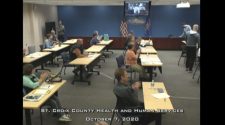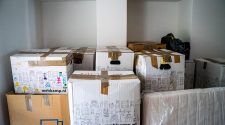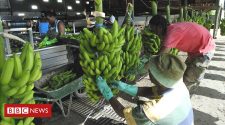The first that staff at Nonga General Hospital in Papua New Guinea heard that they had been treating someone with coronavirus, was when they saw the country’s prime minister announce it in televised press conference on Monday.
They had been treating the patient, a volunteer health worker at the hospital, for pneumonia. She originally came into the hospital in late March, but recovered and was discharged, before her symptoms worsened and she was readmitted.
“This person wasn’t put into isolation or even a different ward. She has been walking around freely in the past few days and talking with us, so we are scared. We all left the hospital and are waiting for someone to come and explain what is happening,” said Margaret Melke, a nurse in Rabaul district, where Nonga Hospital is located.

The woman, who is now recovering at her home, is the second confirmed case of Covid-19 in Papua New Guinea, a nation of roughly eight million people, about 150km north of the Australian mainland. The first was an Australian mining worker, who had flown into the country.
But this time the infected person is a local, who had not recently travelled abroad. The case was detected in a village near Rabaul, a harbourside town on the island of East New Britain.
The prospect of the arrival of coronavirus in a country with just 500 doctors and around 5,000 hospital beds and which struggles to deal with even routine illnesses has terrified the public.

Health workers are asking how the nation’s fractured health system, which routinely leaves clinics without soap or disinfectant and where nurses report using nappies as gauze to mop up blood and rice packets in lieu of gloves, would deal with an outbreak. The country is already dealing with outbreaks of malaria, dengue fever, drug-resistant tuberculosis and polio.
“When one [Covid-19 case] is confirmed, it is a disaster for us. It is already an outbreak,” said Melke, who has spent more than 40 years working in Papua New Guinea’s beleaguered health system and is the Nursing Union Leader for New Guinea Islands.
“We are the frontline, but we do not have safety equipment to protect us, so how can we save others? We put our own families at risk.”
‘I will look out for them, I can die’
After the case was announced by the prime minister on Monday, staff at Nonga General Hospital walked out of the building, refusing to continue working until they knew more.
Deputy chief physician at Nonga Hospital, Dr Alexander Maha, confirmed there was a walkout of staff, but said things settled quickly and staff were given the option to leave if they did not wish to be part of the frontline team. He also said it was protocol for the cases to be announced by the prime minister.
Maha says a section of one of the wards has now been cleared and set up as an isolation area for suspected Covid-19 cases.

“A huge part of what we need to do now is to manage the fear”, explains Dr Maha, “so that others who present with Covid-19 symptoms do not go into hiding. We need them to know that if their results are positive, they are in good hands”.
The fear is acute, especially among health workers. Melke says there was a recent suspected case of coronavirus at Nonga Hospital and the patient was transferred multiple times between hospital departments as medical staff fled, too scared to touch the patient.
“Finally, one nurse put her hand up, declaring that she would sacrifice herself for the sake of the patient,” said Melke, who recalls the nurse said: “‘Larim mi suicide tasol, mi lukautim em, mi ken dai’ [Let me suicide, I will look out for them, I can die] and she alone nursed the patient.”
The patient turned out to have pneumonia and was cleared of Covid-19.
‘There is no medicine’
If anything, the fears are even more acute in rural health clinics, where the resources for nursing staff are even fewer.
A two-hour drive from Rabaul on a road strewn with potholes and corrugation, is the rural health clinic at Warangoi, where nurses report working to the point of exhaustion in desperately under-resourced conditions.

“We struggle with drug shortages, we have endless problems with our facilities and our wards,” says Rosemary Darius, the head nurse at the clinic.
“We don’t have proper equipment to treat patients with, our bedding is not in good condition, we don’t have proper instruments or disinfectants to sanitise our instruments – if coronavirus comes here, we will be disabled. We have nothing to disinfect with.”
Melke used to work at Warangoi clinic.
“I ran away because of the problems here. Even for a mother [who] comes to deliver, there is no gauze, there is no IV fluid, there is no medicine to control the bleeding. We use their nappies. We tell them to give us five of their nappies so we can use them to soak up the blood.
“I am lucky because my husband works at Nonga Hospital, so I would ask him to smuggle some gauze so when I was on duty I could use it. We tell patients to bring their own lap-lap (sarong) so we can soak up the blood. Sometimes there’s no gloves, so we put our hands in the plastic bags of rice just to protect ourselves. Even to wash the floor, we don’t have strong detergents, just Omo (laundry powder). There’s often not enough sanitiser for the nurses even to wash their own hands.”

We get our news about the virus from social media
It is not surprising that in light of these conditions, healthcare workers like those at Warangoi are apprehensive at the news of a positive Covid-19 case in their district.
All the nurses the Guardian spoke to said their families have asked them to stop working as they are scared they will bring the virus back to their villages, or that they might even be chased away.
“We are scared because we are the frontliners receiving the patients. PPE is a big need. We don’t have enough resources, and manpower is one of our biggest concerns,” said Anne Tatau, a nurse at Warangoi health clinic.
Staff say they lack information and training to help them manage a potentially catastrophic outbreak.
Nurses told the Guardian that only higher-level administrative staff have received training since the Covid-19 state of emergency was declared and Tatau says frontline staff “rely on social media, news updates and personal research to inform themselves” about the virus.

Maha, the deputy chief physician at Nonga General Hospital, disputes these claims, saying health workers across the region have been given the opportunity to undertake training by an infection control nurse, but that: “No one turns up.”
Health minister Jelta Wong said on Wednesday that swift and aggressive measures had been put in place to stop the spread of infection in East New Britain, his home province, including rapid response teams composed of epidemiologists, doctors, nurses, and infection prevention and control specialists. Contract tracing has begun and the affected woman’s village is under lockdown, with police officers stationed around it.
Although Maha believes he has the right team, and enough PPE and medical supplies to handle an outbreak in East New Britain, he admits that at times the health system does face some challenges.
“We have been improvising for 20 years, but we’ve always managed,” he said.















